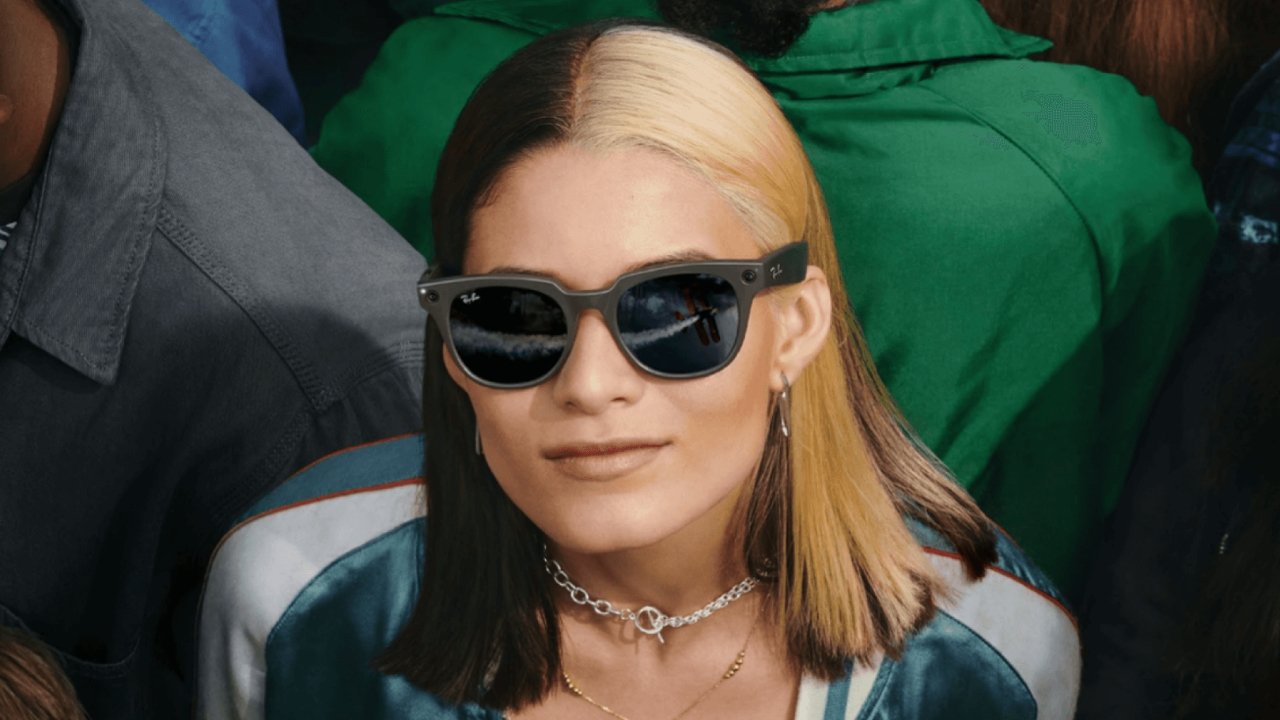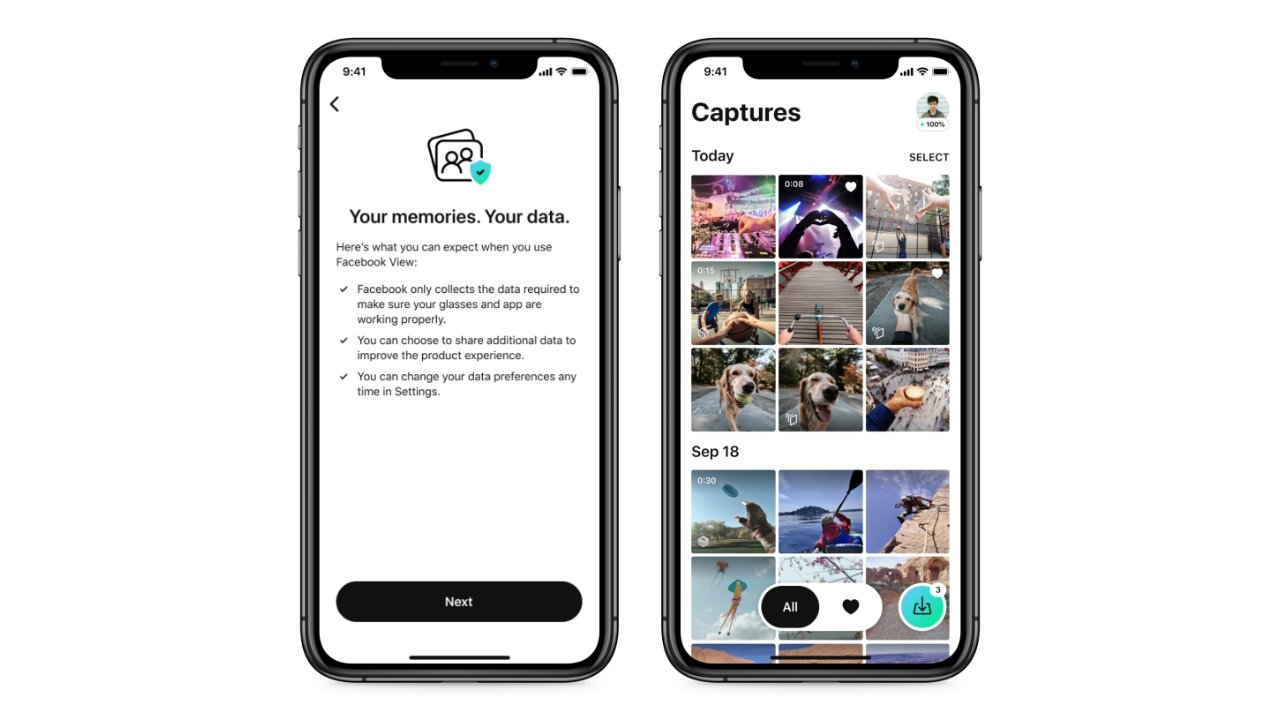Facebook launches $299 Ray-Ban Stories smart glasses
Facebook's $299 Ray-Ban Stories smart glasses come in 20 style combinations and connect to your smartphone to perform basic tasks.

Ray-Ban Stories from Facebook
The Ray-Ban Stories smart glasses house two 5MP cameras for taking photos from a first-person perspective. They connect to your smartphone to make calls, play music, and share photos using voice commands.
The glasses are designed "with privacy in mind" with built-in features to provide control and peace of mind. A privacy micro site has been designed to describe the privacy functions in detail.
Facebook says the glasses play a shutter sound and flash an LED any time a photo is taken. This is meant to alert people around you of the captured photo or video to ease people's mistrust of face-mounted cameras.
"Tampering with this light is against our terms of service," Facebook says. It's not clear how the company will enforce this, or even know that it's happening.

Facebook promises not to use your captured images for advertising
The privacy report says that all information captured by the Ray-Ban Stories belongs to the user and is not used for ads, even when stored within the dedicated Facebook View app. However, once the media is shared, those app's terms apply.
The smart glasses are designed to promote Facebook's product offerings but want to remain service agnostic as well. Photos and video captured by the glasses are saved in the Facebook View app and shared to any compatible platform like TikTok and Snapchat.
Unlike Snap Spectacles, the obvious competitor to Ray-Ban Stories, these glasses can playback audio and be used for calls. In addition, there is a built-in voice assistant that enables some control without interacting with a smartphone or glasses.
In an interview with Fast Company, Mark Zuckerberg discussed the implementation of the glasses and what's next for the technology. He notes these are the first step to an augmented reality future.
Zuckerberg calls Ray-Ban Stories "one milestone on the path to what we envision is the long-term augmented reality glasses."
"There's a bunch of work that still needs to be done there, but while we're working on that long-term vision, I think it's also helpful to kind of work our way up and say 'What's possible and what can we unlock for people today?'" said Zuckerberg. "And that's what this product ends up being."
While these aren't the Project Aria AR glasses that were expected, they pave the way towards a wearable-technology future. Apple has been working on a set of AR glasses as well, often called "Apple Glass."
The Ray-Ban Stories glasses are now available for purchase starting at $299. There are 20 different style options available when choosing color and design.
Read on AppleInsider

Ray-Ban Stories from Facebook
The Ray-Ban Stories smart glasses house two 5MP cameras for taking photos from a first-person perspective. They connect to your smartphone to make calls, play music, and share photos using voice commands.
The glasses are designed "with privacy in mind" with built-in features to provide control and peace of mind. A privacy micro site has been designed to describe the privacy functions in detail.
Facebook says the glasses play a shutter sound and flash an LED any time a photo is taken. This is meant to alert people around you of the captured photo or video to ease people's mistrust of face-mounted cameras.
"Tampering with this light is against our terms of service," Facebook says. It's not clear how the company will enforce this, or even know that it's happening.

Facebook promises not to use your captured images for advertising
The privacy report says that all information captured by the Ray-Ban Stories belongs to the user and is not used for ads, even when stored within the dedicated Facebook View app. However, once the media is shared, those app's terms apply.
The smart glasses are designed to promote Facebook's product offerings but want to remain service agnostic as well. Photos and video captured by the glasses are saved in the Facebook View app and shared to any compatible platform like TikTok and Snapchat.
Unlike Snap Spectacles, the obvious competitor to Ray-Ban Stories, these glasses can playback audio and be used for calls. In addition, there is a built-in voice assistant that enables some control without interacting with a smartphone or glasses.
In an interview with Fast Company, Mark Zuckerberg discussed the implementation of the glasses and what's next for the technology. He notes these are the first step to an augmented reality future.
Zuckerberg calls Ray-Ban Stories "one milestone on the path to what we envision is the long-term augmented reality glasses."
"There's a bunch of work that still needs to be done there, but while we're working on that long-term vision, I think it's also helpful to kind of work our way up and say 'What's possible and what can we unlock for people today?'" said Zuckerberg. "And that's what this product ends up being."
While these aren't the Project Aria AR glasses that were expected, they pave the way towards a wearable-technology future. Apple has been working on a set of AR glasses as well, often called "Apple Glass."
The Ray-Ban Stories glasses are now available for purchase starting at $299. There are 20 different style options available when choosing color and design.
Read on AppleInsider

Comments
NFW not in a million billion gazillion years
How did Facebook phone work out? How did Portal work out?
Whenever I am tempted to think that the broad mass of people are hopelessly irretrievably stupid, I remember that at least they have Zuck's number, even your grandmother who can barely manage to turn on the computer all by herself knows to not trust FB to do the right thing with their personal data.
Can we have an over/under timeframe for FaceBook's Frames' demise?
For the Gordon Gekko in all of us, lol. Seriously though, I suspect products like these will gain in popularity and sizes will shrink in time.
Facebook aint your friend.
https://www.hongkiat.com/blog/bizarre-google-glass-stories/
Does no one remember anything?